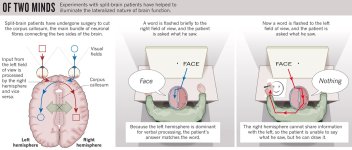excreationist
Married mouth-breather
By multiple personalities I mean having different "minds"... like Freud and id, ego and superego... or the different cognitive functions in MBTI.
I found some information here - I assume it is accurate:
though he calls them "conscious agents" and they aren't necessarily self-aware
https://www.youtube.com/watch?v=CmieNQH7Q4w
1:42:00
I wonder if those concepts in "Being John Malkovich" are based on any old or ancient ideas?
BTW sometimes I have a self-gratifying personality and my self-disciplined personality fights with it - like when I think that I "should" get out of bed. The struggle is quite intense even though it only lasts a couple seconds. If I had got into a habit then the association with the self-disciplined personality would strengthen.
Perhaps Christianity also is relevant... I think there is something about the sinful self and there could be a new self, etc.
BTW in 2019 I was admitted into a mental ward. I believed that both sides of me were verbal.... and I stopped having dreams (which would normally be partly non-verbal). Note I have absolutely no visual imagination and my dreams were ghostly and have never been colour. I remained delusional so they gave me 6(?) lots of ECT. I used to program PHP for 30 hours a week. After hospital I couldn't even handle 8 hours a week.... I think my working memory for programming got a lot worse (I couldn't handle the programming complexity). I think ECT killed off a personality... also in hospital I started coming up with new ideas, etc. (I'm also starting to make more typos and sometimes my visual awareness gets really bad) Though before hospital I'd never had any visual imagination - not even a "ghost" image. But after hospital I would occasionally hallucinate - sometimes in colour...
Then there are "voices" which schizophrenic people hear... I'm not sure where their irrational speech would come from.... it would be interesting to research that - whether the voices could somehow make sense in some way?
I found some information here - I assume it is accurate:
though he calls them "conscious agents" and they aren't necessarily self-aware
https://www.youtube.com/watch?v=CmieNQH7Q4w
1:42:00
1:57:18There's a different personality in the left hemisphere than the right hemisphere one. In one case the left hemisphere believed in God the right hemisphere was an atheist. The left hemisphere wanted to be have a desk job the right hemisphere wanted to be a race car driver and they can even fight. The left hemisphere controls the right hand the right hemisphere controls the left hand and the they can fight. The left hand can be fighting what the right hand is doing. You know trying to cook the left hand might destroy an omelet that you're making. You try to put on some clothes - the left hand might be taking off the clothes the right hand is trying to put on
I think "Being John Malkovich" is revelant. It involves old people going into a mind for their afterlife. They would be able to sometimes affect that mind. Then one of the characters goes into the mind but can not interact with the person at all...they would they were able um to get these split brain patients to have to play 20 questions with each other with themselves you the right hemisphere has a word in mind the left hemisphere doesn't know what it is and then the left hemisphere which can talk can start asking questions is it uh animal is it vegetable is it mineral things like that and the right hemisphere which can't talk but can understand language can use say the left hand to thumbs up for yes thumbs down for no and so these a split brain patient has two separate spheres of consciousness so separate that they can play 20 questions and the left hemisphere doesn't know the answer right the left hemisphere does not know and sometimes will fail to guess in 20 questions what's in the mind of the...
I wonder if those concepts in "Being John Malkovich" are based on any old or ancient ideas?
BTW sometimes I have a self-gratifying personality and my self-disciplined personality fights with it - like when I think that I "should" get out of bed. The struggle is quite intense even though it only lasts a couple seconds. If I had got into a habit then the association with the self-disciplined personality would strengthen.
Perhaps Christianity also is relevant... I think there is something about the sinful self and there could be a new self, etc.
BTW in 2019 I was admitted into a mental ward. I believed that both sides of me were verbal.... and I stopped having dreams (which would normally be partly non-verbal). Note I have absolutely no visual imagination and my dreams were ghostly and have never been colour. I remained delusional so they gave me 6(?) lots of ECT. I used to program PHP for 30 hours a week. After hospital I couldn't even handle 8 hours a week.... I think my working memory for programming got a lot worse (I couldn't handle the programming complexity). I think ECT killed off a personality... also in hospital I started coming up with new ideas, etc. (I'm also starting to make more typos and sometimes my visual awareness gets really bad) Though before hospital I'd never had any visual imagination - not even a "ghost" image. But after hospital I would occasionally hallucinate - sometimes in colour...
Then there are "voices" which schizophrenic people hear... I'm not sure where their irrational speech would come from.... it would be interesting to research that - whether the voices could somehow make sense in some way?

